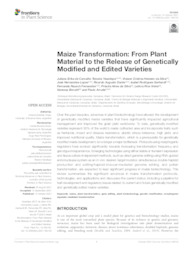Maize transformation: from plant material to the release of genetically modified and edited varieties.
Maize transformation: from plant material to the release of genetically modified and edited varieties.
Author(s): YASSITEPE, J. E. de C. T.; SILVA, V. C. H. da; HERNANDES-LOPES, J.; DANTE, R. A.; GERHARDT, I. R.; FERNANDES, F. R.; SILVA, P. A. da; VIEIRA, L. R.; BONATTI, V.; ARRUDA, P.
Summary: Over the past decades, advances in plant biotechnology have allowed the development of genetically modified maize varieties that have significantly impacted agricultural management and improved the grain yield worldwide. To date, genetically modified varieties represent 30% of the world´s maize cultivated area and incorporate traits such as herbicide, insect and disease resistance, abiotic stress tolerance, high yield, and improved nutritional quality. Maize transformation, which is a prerequisite for genetically modified maize development, is no longer a major bottleneck. Protocols using morphogenic regulators have evolved significantly towards increasing transformation frequency and genotype independence. Emerging technologies using either stable or transient expression and tissue culture-independent methods, such as direct genome editing using RNA-guided endonuclease system as an in vivo desired-target mutator, simultaneous double haploid production and editing/haploid-inducer-mediated genome editing, and pollen transformation, are expected to lead significant progress in maize biotechnology. This review summarises the significant advances in maize transformation protocols, technologies, and applications and discusses the current status, including a pipeline for trait development and regulatory issues related to current and future genetically modified and genetically edited maize varieties.
Publication year: 2021
Types of publication: Journal article
Observation
Some of Embrapa's publications are published as ePub files. To read them, use or download one of the following free software options to your computer or mobile device. Android: Google Play Books; IOS: iBooks; Windows and Linux: Calibre.
Access other publications
Access the Agricultural Research Database (BDPA) to consult Embrapa's full library collection and records.
Visit Embrapa Bookstore to purchase books and other publications sold by Embrapa.

